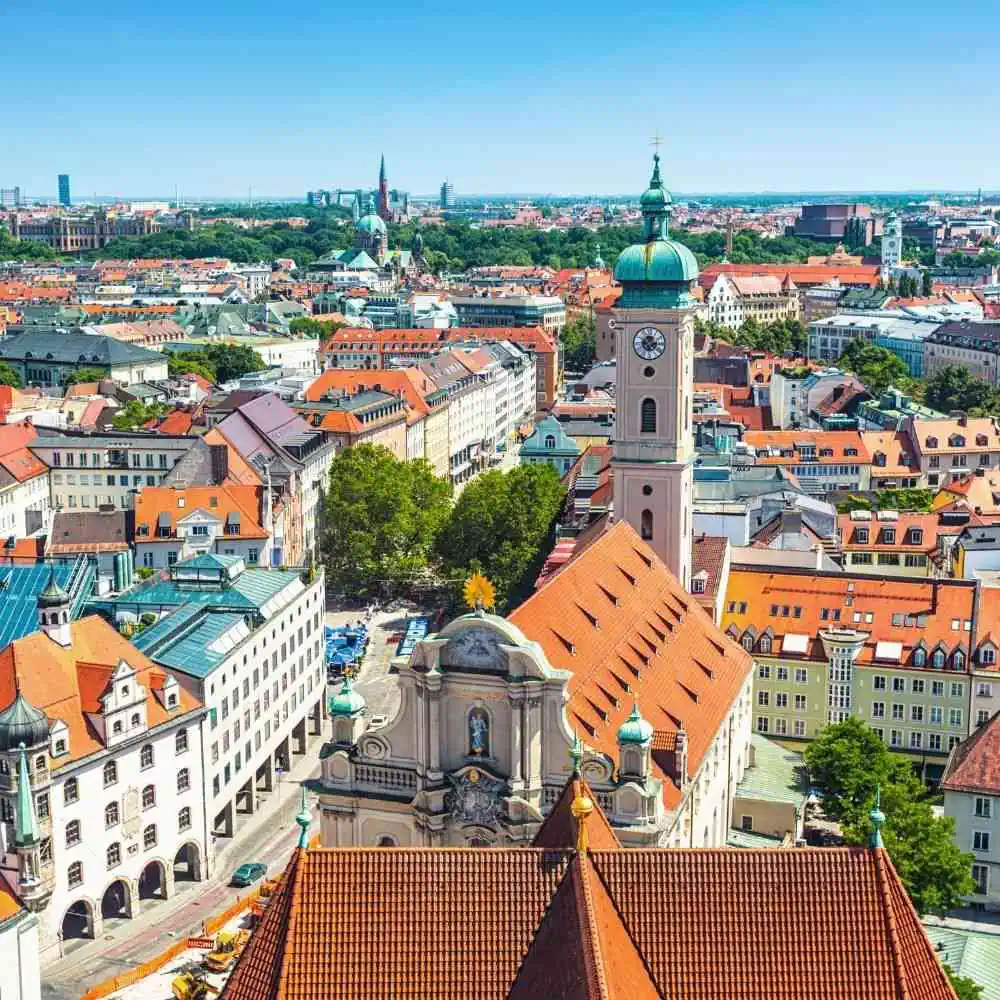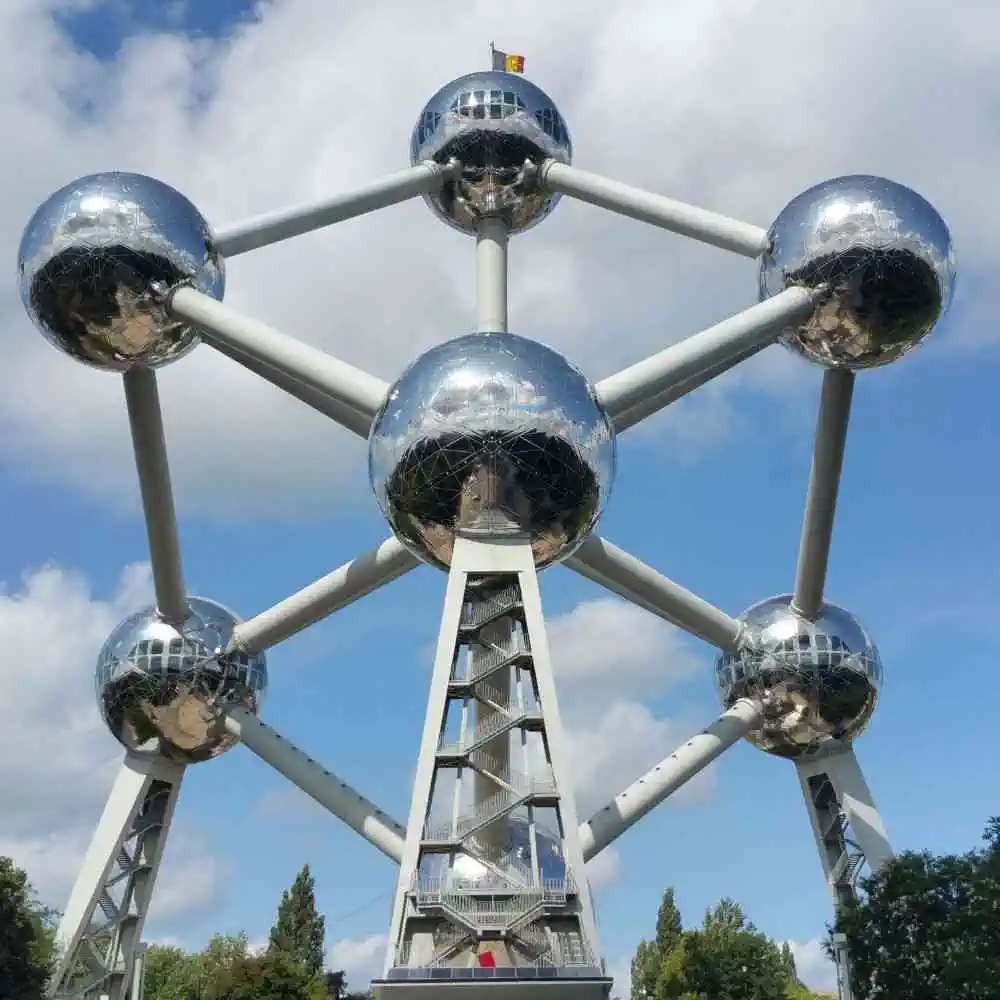You will depart from Brussels, located right in the city center of Brussels, and enjoy the beautiful scenery of the journey while you arrive in Munchen Hbf , also located in the heart of Munich.
Trains from Brussels to Munichfrom $ 93.23
Trains from Brussels to Munich
Travelling by train: Brussels - Munich
Experience Brussels to Munich in Style: An Epic Journey!
Start your grand journey from Brussels, Belgium to Munich, Germany in comfort and style on the train!
This 7 hours ride will take you through the scenic landscapes of Belgium and Germany, with stops in important cities like Liege and Aachen, while passing through beautiful towns along the way. The whole trip stretches about 700 kilometers and offers an unforgettable experience.
Your journey will begin at the Brussels-Midi station. Take in the bustling atmosphere of the hub while you wait for the train. Make sure to try some of the renowned Belgian snacks, such as Belgian Waffles and Belgian Fries, before you get on the train!
After your departure from Brussels, you'll be heading for Liege, Belgium, one of the oldest cities in the region. Here, you'll get a chance to explore the old city center, the Liege Cathedral, and the Citadel of Liege. Next, you'll be making a stop in Aachen, Germany, before arriving in Munich.
Once in Munich Hauptbahnhof, you'll be able to explore the city's iconic attractions, such as Marienplatz, the English Garden, and the famous Hofbräuhaus.
Make sure to book a ticket early and enjoy the best of Belgium and Germany on this epic journey from Brussels to Munich!

Journey details
How long does the train from Brussels to Munich take?
The average train journey between Brussels, Belgium, and Munich, Germany, takes approximately 7 hours and 30 minutes.
What is the fastest journey from Brussels to Munich by train?
The fastest train journey from Brussels to Munich can take about 6 hours and 45 minutes.
How much does the train cost from Brussels to Munich?
Train tickets from Brussels to Munich can vary, but prices start from around €89.
How much does the Brussels to Munich?
No, there are no direct trains from Brussels to Munich; at least one transfer is required.
What is the distance from Brussels to Munich by train?
The distance by train from Brussels to Munich is approximately 694 Km.
Which are the cities that the train stops from Brussels to Munich?
The train journey from Brussels to Munich typically includes stops in key cities like Frankfurt and Stuttgart.
Buy train tickets from Brussels to Munich
Traveling by train from Brussels to Munich is an easy and comfortable journey. RailClick is the best way to travel Europe by train.
Brussels: Places to see
Brussels, the capital of Belgium, is a city full of architectural wonders and gastronomical delights. From cobblestoned streets and ancient monuments to world-renowned chocolate and beer, this city has something for everyone. Let’s take a deeper look into some of the top sites to make sure your trip to Brussels is complete.
Grand Place: Located in the centre of the city, this UNESCO World Heritage Site is a must-see. Admire the ornate buildings, from the city hall, to the guild houses, and the striking gothic churches, all surrounded by terracotta-hued buildings. Open to the public all year round, entry to Grand Place is free.
Manneken Pis: This famous statue of a little boy urinating is perhaps the most iconic symbol of Brussels. Check out the many costumes the figure wears, which change regularly. Find it just a few minutes’ walk from Grand Place.
Atomium: This iconic landmark made up of steel spheres is the symbol of Brussels. First constructed in 1958, it was renovated in 2006 and is now a museum that delves into the history of Brussels and its people. Open daily from 10am to 6pm, tickets cost €12.
Cinquantenaire: This sprawling urban park, located to the east of the city, features a mixture of art galleries, museums, and monuments, including the Royal Military Museum and Autoworld. Open all year round, admission to most of the attractions here is free.
Royal Palace of Brussels: Catch a glimpse of grandeur from this 19th century building, which serves as the official residence of the Belgian Royal Family. Open to the public from July to September, tours of the palace cost €8.
Cathedral of St. Michael and St. Gudula: This gothic-style cathedral dates back to the 13th century and features beautiful stained glass windows and tombs. Open to the public from April to October, admission is free.
Delirium Café: One of Brussels’ most famous bars, this lively spot offers a huge selection of beers. With a whopping 3,000 varieties to choose from, there’s something here for everyone. Open daily until 4am, it’s the perfect place to end your night out in style.
So there you have it! From iconic monuments to fantastic food and drink, Brussels has something for everyone. Be sure to make the most of your trip and don’t forget to take plenty of pictures!

Munich: Places to see
Munich (München), in Germany is a fascinating destination that offers visitors a blend of city delights, lively culture, and rich historical and architectural gems to explore. From soaring cathedrals to beautiful parks to world-famous beer halls, there is something for everyone in this Bavarian city. Here is a list of seven must-visit sites while in Munich, including information on each spot’s historical and architectural significance, practical details, and insider tips.
Nymphenburg Palace: The grand Baroque palace, built for Elector Ferdinand Maria in 1664, is now a museum featuring beautiful galleries and gardens. Located in the western section of Munich, it is a great spot for a leisurely stroll. Entrance is €12.50 and it’s open until 6 pm. Take a guided tour to learn more about its history.
Hofbräuhaus: This legendary beer hall has been around since 1589, and remains one of the most iconic spots in Munich. Here, visitors can sample the city’s famous Bavarian beer while enjoying traditional Bavarian dishes. Prices are quite reasonable and its open until at least 11 pm. Come early to avoid the crowds and find a good seat.
Marienplatz and City Hall: Located in the heart of the city, Marienplatz is one of Munich’s most iconic squares. The Old City Hall (Altes Rathaus) here is a magnificent Gothic building, while the New City Hall (Neues Rathaus) boasts a unique Neo-Gothic exterior. Free to visit. Catch the famous Glockenspiel at the New City Hall at 11 am or 12 pm.
English Garden: This large public park is a haven of nature and tranquillity in Munich. Spanning an area of more than 920 acres, it’s a great spot for a relaxing walk or a picnic. It also features a beer garden. Free to visit. Take a boat ride along the lake for the perfect romantic evening.
Frauenkirche and St. Peters Church: Located on Munich’s central pedestrianised street, these two churches are important landmarks that offer visitors a glimpse of the city’s religious traditions. Frauenkirche is an impressive Gothic building, while St. Peters is a more modern structure. Free to visit. Look out for the beautiful stained glass windows inside.
BMW Museum: Learn all about the famous German carmaker at this factual and educational museum in Munich. Visitors get a comprehensive overview of the company’s history, as well as a chance to explore some of its iconic cars. Entrance is €12 and the museum is open until 8 pm. Book a guided tour to get the full experience.
Viktualienmarkt: This colorful, traditional food market is the perfect place to sample some of Munich’s local specialties. Here, visitors can find Bavarian sausages, freshly baked pretzels, cheeses, cakes, and plenty of other delicious treats. Free to visit. Stop by on a Sunday morning to experience the market in all its glory.
A trip to Munich provides a wealth of experiences for travelers, from beer halls to old churches to fascinating museums. Whether you’re looking for a cultural exploration or a romantic getaway, the city’s diverse offerings guarantee an enjoyable time.

Brussels: Main train stations
Brussels, the capital of Belgium, has its main train station "Brussels-Central" located right in the city centre. It's the largest and busiest station in the country. From there, you can reach all important Belgian cities and even other European countries. The city also hosts several other minor stations such as Bruxelles-Midi, Brussels-North and Brussels-Luxembourg.
Brussels-Central is located at Rue de l'Infante Isabelle 1, 1000 Brussels. The station is open 24 hours a day, 7 days a week. For more information you can call +32 2 224 12 11. It also provides facilities such as ATM, restaurants, toilets, lockers and luggage storage.
- Brussels Midi/Zuid
- Brussels Airport - Zaventem
- Bruxelles-Nord
- Bruxelles-Luxembourg
- Bruxelles-Schuman
- Bruxelles
- Bruxelles-Chapelle
- Brussel Congres
- Brussel-West
Munich: Main train stations
Munich, in Germany is home to the country's largest train station, München Hauptbahnhof. Connecting the city to over 150 destinations and serving as many as 450,000 passengers a day, it is the busiest train station in Germany. There are also other important train stations in Munich such as München Ost, München Pasing or München Laim.
München Hauptbahnhof is situated at Bayerstrasse 10a-c, 80335 Munich. It is open 24 hours a day, 7 days a week. There are several services available, including luggage storage and a staffed information desk. The station can be reached by car and public transport such as S-Bahn, U-Bahn and buses, and is located near the city center, allowing passengers to reach popular tourist attractions easily.
- Munchen Hbf
- Munchen Ost
- Munchen-Pasing
- Munchen Hackerbrucke
Brussels - Munich: How to get the best deals
Book in Advance:
Just like with airfares, train ticket prices tend to rise as the departure date gets closer. Booking weeks or even months in advance can save you a significant amount.
Travel During Off-Peak Hours:
Avoid traveling during peak times such as weekday mornings and evenings. Opt for midday, late evening, or mid-week rides when there's less demand.
Consider Slower Trains or non direct routes:
Express or high-speed trains might save time, but they're often pricier. Opting for regional or slower services can reduce your fare.
Look for Special Deals and Promotions:
Train operators occasionally have promotions or special deals, especially during off-peak seasons. It's worth signing up for newsletters. Additionally, there are sometimes group or return ticket discounts, so consider these options if they fit your travel plans.
- Contact Us


